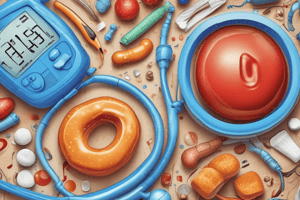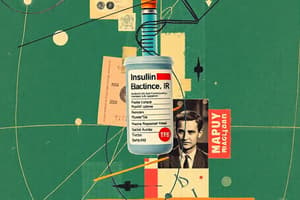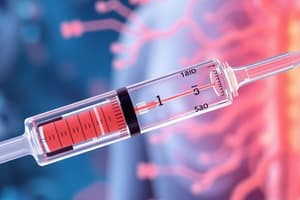Podcast
Questions and Answers
Which of the following is a short-acting insulin example?
Which of the following is a short-acting insulin example?
- Insulin aspart (correct)
- Neutral Protamine Hagedorn (NPH) insulin
- Insulin glargine
- Insulin detemir
What is the primary mechanism of action of insulin in the body?
What is the primary mechanism of action of insulin in the body?
- Promotes uptake of glucose by cells (correct)
- Increases blood glucose levels
- Releases glycogen from liver
- Inhibits glucose transporters
Which of the following drugs is classified as a long-acting insulin?
Which of the following drugs is classified as a long-acting insulin?
- Insulin lispro
- Insulin Lente
- Insulin ultralente (correct)
- Insulin aspart
What is NOT a function of insulin in the body?
What is NOT a function of insulin in the body?
Which insulin form is characterized by the longest duration of action?
Which insulin form is characterized by the longest duration of action?
What is a key action of thiazolidinediones in relation to glucose uptake?
What is a key action of thiazolidinediones in relation to glucose uptake?
Which of the following is a side effect associated with thiazolidinediones?
Which of the following is a side effect associated with thiazolidinediones?
How do thiazolidinediones affect sodium and glomerular filtration rate?
How do thiazolidinediones affect sodium and glomerular filtration rate?
What hormonal effect does adiponectin have that is mediated by thiazolidinediones?
What hormonal effect does adiponectin have that is mediated by thiazolidinediones?
What is the primary mechanism of action for SGLT2 inhibitors?
What is the primary mechanism of action for SGLT2 inhibitors?
Which of the following is considered a potential adverse effect of SGLT2 inhibitors?
Which of the following is considered a potential adverse effect of SGLT2 inhibitors?
Thiazolidinediones are contraindicated in which of the following conditions?
Thiazolidinediones are contraindicated in which of the following conditions?
What is a characteristic of α-Glucosidase Inhibitors?
What is a characteristic of α-Glucosidase Inhibitors?
Which of the following statements about Dapagliflozin is accurate?
Which of the following statements about Dapagliflozin is accurate?
How do α-Glucosidase Inhibitors affect post-meal blood sugar levels?
How do α-Glucosidase Inhibitors affect post-meal blood sugar levels?
What is a unique feature of the SGLT2 inhibitors compared to some other diabetes medications?
What is a unique feature of the SGLT2 inhibitors compared to some other diabetes medications?
How do AGIs manage postprandial blood glucose levels?
How do AGIs manage postprandial blood glucose levels?
Which of the following diabetes medications carries a risk of increased incidence of certain cancers?
Which of the following diabetes medications carries a risk of increased incidence of certain cancers?
What is the primary indication for α-glucosidase inhibitors such as acarbose?
What is the primary indication for α-glucosidase inhibitors such as acarbose?
What side effect is commonly associated with α-glucosidase inhibitors?
What side effect is commonly associated with α-glucosidase inhibitors?
Which of the following conditions contraindicates the use of α-glucosidase inhibitors?
Which of the following conditions contraindicates the use of α-glucosidase inhibitors?
How does miglitol function pharmacologically?
How does miglitol function pharmacologically?
What is the mechanism of action of GLP-1 in patients with type 2 diabetes?
What is the mechanism of action of GLP-1 in patients with type 2 diabetes?
What management is recommended for hypoglycemia associated with α-glucosidase inhibitors?
What management is recommended for hypoglycemia associated with α-glucosidase inhibitors?
Which of these drugs is a Dipeptidyl Peptidase (DPP)-4 inhibitor?
Which of these drugs is a Dipeptidyl Peptidase (DPP)-4 inhibitor?
What effect does prolonged use of α-glucosidase inhibitors have on gastrointestinal side effects?
What effect does prolonged use of α-glucosidase inhibitors have on gastrointestinal side effects?
What is the primary mechanism of action of biguanides like Metformin?
What is the primary mechanism of action of biguanides like Metformin?
What causes lipoatrophy and lipohypertrophy related to insulin use?
What causes lipoatrophy and lipohypertrophy related to insulin use?
Which of the following describes the pharmacokinetics of NPH insulin?
Which of the following describes the pharmacokinetics of NPH insulin?
Which side effect is associated with Metformin use?
Which side effect is associated with Metformin use?
What is the primary action of sulfonylureas in treating diabetes?
What is the primary action of sulfonylureas in treating diabetes?
What characterizes the pharmacokinetics of second-generation sulfonylureas?
What characterizes the pharmacokinetics of second-generation sulfonylureas?
What condition is a contraindication for the use of Metformin?
What condition is a contraindication for the use of Metformin?
What aspect of SGLT2 inhibitors contributes to their mechanism of action?
What aspect of SGLT2 inhibitors contributes to their mechanism of action?
Which of the following side effects is less common with second-generation sulfonylureas compared to first-generation agents?
Which of the following side effects is less common with second-generation sulfonylureas compared to first-generation agents?
Which of the following agents is a first-generation sulfonylurea?
Which of the following agents is a first-generation sulfonylurea?
What is the role of adenosine monophosphate (AMP) kinase in the action of Metformin?
What is the role of adenosine monophosphate (AMP) kinase in the action of Metformin?
What effect does glucagon have on blood glucose levels?
What effect does glucagon have on blood glucose levels?
What is the risk associated with the use of first-generation sulfonylureas that is less prominent with second-generation drugs?
What is the risk associated with the use of first-generation sulfonylureas that is less prominent with second-generation drugs?
What is the outcome of crystals varying in size on lente insulins?
What is the outcome of crystals varying in size on lente insulins?
Flashcards are hidden until you start studying
Study Notes
Drugs Used in Diabetes
- Various drug classes are used in diabetes management, each with specific mechanisms of action.
Insulin
- Forms include Regular insulin, NPH (Intermediate-acting), and Long-acting insulins like Insulin glargine and detemir.
- Insulin promotes glucose uptake in cells by mobilizing glucose transporters (GLUT-4).
- Increases glycogen storage in liver and muscle; inhibits gluconeogenesis.
- Insulin also promotes protein synthesis and fat storage, and interacts with IGF-1 receptors for growth effects.
Pharmacokinetics of Insulin
- Delivered mostly subcutaneously, with some formulations available for inhalation.
- Variability exists among individuals regarding the peak hypoglycemic effect.
- Lente insulins are absorbed slowly due to larger crystal sizes.
Indications and Side Effects of Insulin
- Indicated for both Type 1 and Type 2 diabetes.
- Common side effects include hypoglycemia, lipodystrophy (lipoatrophy and lipohypertrophy), and edema.
NPH Insulin
- NPH is regular insulin modified with protamine and zinc to slow absorption.
- Used in diabetes management for its steady effect.
Biguanides
- Prototype: Metformin, which reduces blood glucose without stimulating insulin secretion.
- Acts by reducing gluconeogenesis and enhancing insulin action through AMP kinase activation.
- Helps delay glucose absorption from the gastrointestinal tract.
Pharmacology of Metformin
- Excreted unchanged in urine; contraindicated in cases of metabolic acidosis.
- Side effects include abdominal discomfort, nausea, diarrhea, and rare instances of lactic acidosis.
Sulfonylureas (SUs)
- Oral agents that stimulate insulin secretion from pancreatic beta cells.
- First-generation prototype: Tolbutamide; Second-generation prototype: Glyburide.
Mechanism of Action for SUs
- Bind to cellular receptors on beta cells, leading to calcium influx and increased insulin release.
- Reduce glucagon levels to lower glucose production.
Pharmacokinetics of SUs
- Varying half-lives, with first-generation agents generally longer.
- All are metabolized by the liver and excreted in urine; dosage adjustment may be necessary in liver impairment.
Indications and Side Effects of SUs
- Indicated for Type 2 diabetes; potential hypoglycemia if taken with other agents.
- Other side effects may include flushing (older agents), weight gain, and hematologic toxicities.
SGLT2 Inhibitors
- Prototypes include Dapagliflozin, working by reducing glucose reabsorption in kidneys.
- Actions lead to increased urinary glucose excretion without stimulating insulin secretion.
Adverse Effects of SGLT2 Inhibitors
- Fatigue, increased urination, risk of genital/urinary infections, and rare hypoglycemia.
Alpha-Glucosidase Inhibitors (AGIs)
- Prototype: Acarbose; reduce blood glucose by delaying carbohydrate absorption in the gut.
- They competitively inhibit glucosidases, leading to lower post-meal glucose spikes.
Side Effects and Contraindications of AGIs
- Side effects include flatulence, bloating, and diarrhea; contraindicated in IBS and inflammatory bowel disease.
Incretins
- Prototypes: DPP-4 inhibitors like sitagliptin and incretin mimetics like exenatide.
- Incretin hormones lower blood glucose by stimulating insulin and reducing glucagon.
Thiazolidinediones
- Examples include rosiglitazone and pioglitazone; indicated for type 2 diabetes.
- Contraindicated in cases of heart failure, with side effects including weight gain, edema, and potential heart issues.
Studying That Suits You
Use AI to generate personalized quizzes and flashcards to suit your learning preferences.



